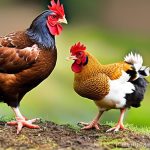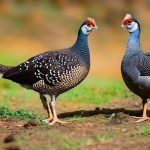Avian flu, also known as bird flu, is a highly contagious viral disease that primarily affects birds, including domestic poultry such as chickens, ducks, and turkeys, as well as wild birds. The virus can also infect humans and other animals, and in some cases, it can be fatal. There are several strains of avian flu, with the H5N1 and H7N9 strains being the most well-known for their potential to cause severe illness in humans.
The virus is spread through contact with infected birds or their droppings, as well as through contaminated surfaces and objects. It can also be transmitted through the air over short distances. Avian flu can have devastating effects on poultry populations, leading to significant economic losses for farmers and the poultry industry.
In addition to the economic impact, the virus poses a public health threat due to its potential to cause severe illness and death in humans. It is important for poultry owners and the general public to be aware of the signs and symptoms of avian flu, as well as the measures that can be taken to prevent its spread. Avian flu is a zoonotic disease, meaning it can be transmitted from animals to humans.
While human-to-human transmission is rare, it can occur in cases where there is close contact with infected birds or their bodily fluids. The symptoms of avian flu in humans can range from mild to severe and may include fever, cough, sore throat, muscle aches, and difficulty breathing. In severe cases, the virus can lead to pneumonia, acute respiratory distress syndrome, and even death.
It is important for individuals who work with poultry or live in areas where avian flu outbreaks have occurred to take precautions to protect themselves and their families from infection. This includes practicing good hygiene, avoiding contact with sick or dead birds, and seeking medical attention if they develop symptoms of avian flu.
Table of Contents
Key Takeaways
- Avian flu is a highly contagious viral disease that affects birds, including chickens, and can also be transmitted to humans.
- Biosecurity measures for chicken coops, such as controlling access to the coop and regularly cleaning and disinfecting, are essential for preventing the spread of avian flu.
- It is important to be able to identify and report avian flu symptoms in birds, such as sudden death, coughing, sneezing, and a drop in egg production.
- Vaccination and health management practices, such as providing a balanced diet and regular health checks, are crucial for preventing avian flu in chickens.
- Safe handling and disposal of infected birds, including wearing protective gear and properly disposing of carcasses, is important to prevent the spread of avian flu.
Biosecurity Measures for Chicken Coops
Controlling Access to the Premises
One of the most important biosecurity measures is controlling access to the chicken coop and other areas where poultry are kept. This can be done by limiting the number of people who have access to the premises and requiring them to follow specific protocols, such as wearing protective clothing and footwear and using footbaths to disinfect their shoes before entering and leaving the area.
Maintaining Strict Hygiene Practices
Maintaining strict hygiene practices is also crucial for preventing the spread of avian flu. This includes regularly cleaning and disinfecting the chicken coop and equipment, as well as practicing good personal hygiene when handling poultry. It is important to use appropriate cleaning and disinfecting agents that are effective against avian flu virus, and to follow recommended protocols for their use.
Monitoring Bird Health and Preventing Contact with Wild Birds
It is important to monitor the health of the birds regularly and to isolate any sick or potentially infected birds from the rest of the flock. This can help prevent the spread of the virus within the flock and reduce the risk of transmission to other birds or humans. Additionally, preventing contact between domestic poultry and wild birds, which can carry the avian flu virus, is crucial. This can be done by using physical barriers such as netting or fencing to keep wild birds away from the chicken coop, as well as by avoiding practices that attract wild birds, such as leaving food or water sources uncovered.
Identifying and Reporting Avian Flu Symptoms

Identifying and reporting avian flu symptoms is crucial for controlling outbreaks and preventing the spread of the virus. Poultry owners should be familiar with the signs of avian flu in birds, which can include sudden death, decreased egg production, respiratory distress, swelling of the head, neck, and eyes, and diarrhea. In addition to these physical symptoms, birds infected with avian flu may also exhibit behavioral changes such as lethargy, loss of appetite, and reluctance to move.
It is important for poultry owners to monitor their flocks closely for any signs of illness and to seek veterinary advice if they suspect that their birds may be infected with avian flu. In addition to monitoring their own flocks, poultry owners should also be vigilant for signs of avian flu in wild birds in their area. Wild birds can carry the virus without showing any symptoms, so it is important to report any unusual bird deaths or signs of illness to local wildlife authorities or agricultural agencies.
This can help identify potential outbreaks of avian flu in wild bird populations and prevent the spread of the virus to domestic poultry. Reporting suspected cases of avian flu is essential for controlling outbreaks and implementing measures to prevent its spread. Poultry owners should contact their local veterinary authorities or agricultural agencies if they suspect that their birds may be infected with avian flu.
In addition, they should follow any reporting requirements that are in place in their area, such as notifying local authorities of any unusual bird deaths or signs of illness. By identifying and reporting avian flu symptoms promptly, poultry owners can help protect their flocks and prevent the spread of the virus to other birds or humans.
Vaccination and Health Management
Vaccination is an important tool for preventing avian flu in poultry flocks. There are several vaccines available that can help protect chickens, ducks, and turkeys from avian flu, including both inactivated and live attenuated vaccines. These vaccines stimulate the bird’s immune system to produce antibodies against the virus, reducing the likelihood of infection and disease if they are exposed to the virus.
Vaccination is typically recommended for poultry in areas where avian flu is endemic or where there is a high risk of exposure to infected birds. In addition to vaccination, good health management practices are essential for preventing avian flu in poultry flocks. This includes providing a clean and hygienic environment for the birds, ensuring they have access to clean water and nutritious feed, and monitoring their health regularly.
It is important to practice good biosecurity measures to prevent contact with wild birds or other potential sources of infection, as well as to isolate any sick or potentially infected birds from the rest of the flock. In some cases, antiviral medications may be used to treat avian flu in poultry flocks. These medications can help reduce the severity of illness and prevent the spread of the virus within the flock.
However, it is important to use these medications under veterinary supervision and according to recommended protocols to ensure their effectiveness and minimize the risk of developing antiviral resistance.
Safe Handling and Disposal of Infected Birds
In the event of an avian flu outbreak in a poultry flock, it is important to handle infected birds safely and dispose of them properly to prevent further spread of the virus. Infected birds should be handled with care to minimize the risk of exposure to the virus. This includes wearing appropriate personal protective equipment such as gloves, masks, and protective clothing when handling sick or dead birds, as well as following recommended hygiene practices such as handwashing and disinfection.
Infected birds should be disposed of in a manner that prevents further spread of the virus. This may include burying them on-site in a manner that prevents scavenging by wild animals or incinerating them at high temperatures to destroy the virus. It is important to follow recommended protocols for safe disposal of infected birds to minimize the risk of environmental contamination and transmission to other birds or humans.
In addition to handling and disposing of infected birds safely, it is important to clean and disinfect the area where they were kept to remove any traces of the virus. This may include cleaning and disinfecting equipment, surfaces, and facilities using appropriate agents that are effective against avian flu virus. By following recommended protocols for safe handling and disposal of infected birds, poultry owners can help prevent further spread of the virus and protect their flocks from infection.
Preventing Contact with Wild Birds

Physical Barriers: A Key to Prevention
Poultry owners can take several measures to minimize contact between domestic poultry and wild birds. One effective method is to use physical barriers such as netting or fencing to keep wild birds away from the chicken coop or other areas where poultry are kept.
Avoiding Attractants
In addition to using physical barriers, it is essential to avoid practices that attract wild birds to the area where poultry are kept. This includes keeping food and water sources covered or enclosed to prevent access by wild birds, as well as removing any sources of standing water that may attract them.
Monitoring Wild Bird Populations
It is also vital for poultry owners to be aware of any wild bird populations in their area that may carry avian flu virus. This includes migratory bird species that travel through the area seasonally or resident bird populations that may come into contact with domestic poultry. By monitoring wild bird populations in their area and taking steps to minimize contact with domestic poultry, poultry owners can help reduce the risk of avian flu in their flocks.
Educating Yourself and Others in the Community
Educating yourself and others in the community about avian flu is essential for preventing outbreaks and controlling its spread. Poultry owners should be familiar with the signs and symptoms of avian flu in birds, as well as recommended biosecurity measures for preventing its spread. This includes practicing good hygiene when handling poultry, monitoring bird health regularly, and seeking veterinary advice if they suspect their birds may be infected with avian flu.
In addition to educating themselves about avian flu, poultry owners can also play a role in educating others in their community about the virus. This may include sharing information about biosecurity measures for preventing avian flu in poultry flocks with other poultry owners or community members who may come into contact with domestic poultry. By raising awareness about avian flu and its potential impact on poultry populations and public health, poultry owners can help prevent outbreaks and reduce the risk of transmission within their community.
Local agricultural agencies or veterinary authorities may also provide educational resources about avian flu for poultry owners and community members. This may include information about vaccination programs, biosecurity measures, and reporting requirements for suspected cases of avian flu. By taking advantage of these resources and sharing information with others in their community, poultry owners can help protect their flocks from avian flu and contribute to efforts to control its spread.
In conclusion, avian flu is a highly contagious viral disease that poses a significant threat to poultry populations and public health. By understanding the signs and symptoms of avian flu in birds, implementing biosecurity measures for chicken coops, identifying and reporting suspected cases promptly, vaccinating poultry flocks, handling infected birds safely, preventing contact with wild birds, and educating themselves and others in the community about avian flu, poultry owners can help prevent outbreaks and control its spread. It is important for poultry owners to stay informed about avian flu and take proactive measures to protect their flocks from infection while also contributing to efforts to control its spread within their community.
If you’re looking for a reliable chicken coop to keep your flock safe from avian flu, you might want to consider the Producers Pride Sentinel Chicken Coop. This coop is designed to provide a secure and comfortable environment for your chickens, helping to minimize the risk of exposure to avian flu. For more information on how to keep your chickens safe from avian flu, check out this helpful article on Poultry Wizard’s website: Producers Pride Sentinel Chicken Coop.
FAQs
What is avian flu?
Avian flu, also known as bird flu, is a type of influenza virus that primarily affects birds. It can also infect humans and other animals in some cases.
How can chickens get avian flu?
Chickens can get avian flu through direct contact with infected birds, contaminated surfaces, or through the air. Wild birds, particularly waterfowl, are natural carriers of the virus and can spread it to domestic poultry.
What are the symptoms of avian flu in chickens?
Symptoms of avian flu in chickens can include respiratory distress, decreased egg production, swelling of the head, and sudden death. It is important to note that not all infected birds will show symptoms.
How can I keep my chickens safe from avian flu?
To keep chickens safe from avian flu, it is important to practice good biosecurity measures, such as limiting exposure to wild birds, keeping the coop and surrounding areas clean, and preventing contact with potentially infected birds.
Can humans get avian flu from chickens?
Yes, humans can get avian flu from infected chickens, particularly through close contact with sick birds or their droppings. However, the risk of human infection is generally low, and most cases have occurred in people with direct exposure to infected poultry.
Meet Walter, the feathered-friend fanatic of Florida! Nestled in the sunshine state, Walter struts through life with his feathered companions, clucking his way to happiness. With a coop that’s fancier than a five-star hotel, he’s the Don Juan of the chicken world. When he’s not teaching his hens to do the cha-cha, you’ll find him in a heated debate with his prized rooster, Sir Clucks-a-Lot. Walter’s poultry passion is no yolk; he’s the sunny-side-up guy you never knew you needed in your flock of friends!







